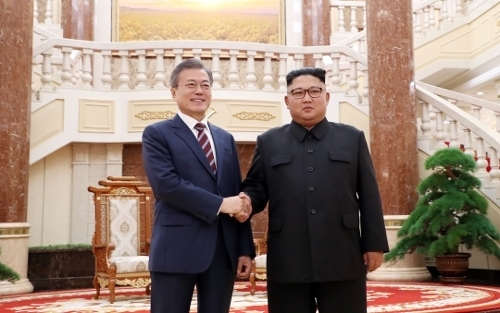‘Inter-Korean exchange should accompany North’s disarmament’
By Choi Si-youngPublished : May 27, 2020 - 14:59

South Korea should make sure that inter-Korean exchanges proceed in parallel with North Korea’s denuclearization, the US State Department said Tuesday, reiterating its earlier stance made public several times.
The department, asked by Voice of America about Seoul’s latest decision to ease restrictions on engagement with Pyongyang, said Washington supports inter-Korean cooperation, but that it should be in “lockstep with progress on denuclearization.”
On Tuesday, Seoul’s Ministry of Unification said it would amend a law on inter-Korean exchange so that citizens here could have greater freedom to interact with North Koreans.
Under the revision, South Koreans would still have to report contact with the North to the ministry, but could do so after the encounter if advance notice was not feasible. Chance encounters would not have to be reported.
Only people pursuing business deals with the North would have to alert the ministry; there would be no need to do so after friendly gatherings, especially among families separated by the 1950-53 Korean War. Past governments sometimes refused permission in such cases on national security grounds.
The new law would also allow municipalities to independently do business with North Korea, without an intermediary. Local firms would be able to open offices in the communist country.
The purpose of the measures is to establish a legal framework for more active inter-Korean exchanges when the stalled projects are up and running again, according to the ministry.
President Moon Jae-in has repeatedly championed stronger inter-Korean exchange and cooperation, despite the scant progress on the North’s nuclear disarmament.
“Giving more room to people and municipalities so they start taking on inter-Korean projects on their own is what we have in mind,” the ministry said, explaining why it was suddenly introducing sweeping changes to the law on inter-Korean exchange, which was passed some 30 years ago.
South Korea’s National Assembly will vote on the revised law later this year.
The department, asked by Voice of America about Seoul’s latest decision to ease restrictions on engagement with Pyongyang, said Washington supports inter-Korean cooperation, but that it should be in “lockstep with progress on denuclearization.”
On Tuesday, Seoul’s Ministry of Unification said it would amend a law on inter-Korean exchange so that citizens here could have greater freedom to interact with North Koreans.
Under the revision, South Koreans would still have to report contact with the North to the ministry, but could do so after the encounter if advance notice was not feasible. Chance encounters would not have to be reported.
Only people pursuing business deals with the North would have to alert the ministry; there would be no need to do so after friendly gatherings, especially among families separated by the 1950-53 Korean War. Past governments sometimes refused permission in such cases on national security grounds.
The new law would also allow municipalities to independently do business with North Korea, without an intermediary. Local firms would be able to open offices in the communist country.
The purpose of the measures is to establish a legal framework for more active inter-Korean exchanges when the stalled projects are up and running again, according to the ministry.
President Moon Jae-in has repeatedly championed stronger inter-Korean exchange and cooperation, despite the scant progress on the North’s nuclear disarmament.
“Giving more room to people and municipalities so they start taking on inter-Korean projects on their own is what we have in mind,” the ministry said, explaining why it was suddenly introducing sweeping changes to the law on inter-Korean exchange, which was passed some 30 years ago.
South Korea’s National Assembly will vote on the revised law later this year.










![[Today’s K-pop] BTS pop-up event to come to Seoul](http://res.heraldm.com/phpwas/restmb_idxmake.php?idx=644&simg=/content/image/2024/04/17/20240417050734_0.jpg&u=)
![[Graphic News] More Koreans say they plan long-distance trips this year](http://res.heraldm.com/phpwas/restmb_idxmake.php?idx=644&simg=/content/image/2024/04/17/20240417050828_0.gif&u=)






![[KH Explains] Hyundai's full hybrid edge to pay off amid slow transition to pure EVs](http://res.heraldm.com/phpwas/restmb_idxmake.php?idx=652&simg=/content/image/2024/04/18/20240418050645_0.jpg&u=20240419100350)

